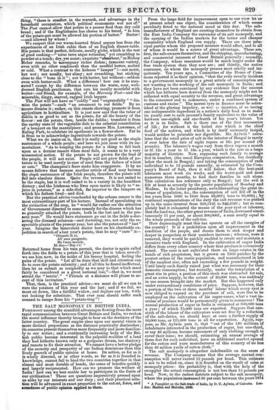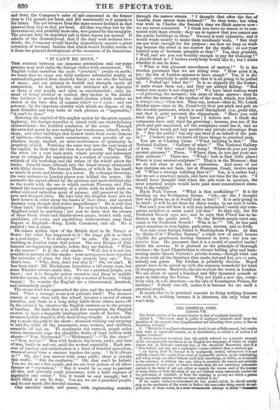THE SALT MONOPOLY IN BRITISH INDIA.
FOREMOST among the manifold advantages flowing from the more rapid communication between Great Britain and India, we reckon the moral influence thereby brought to bear on the destinies of the latter country. The great empire rises upon our mental vision in more distinct proportions as the distance practically diminishes ; its concerns present themselves more frequently and more familiar- ly to our notice ; and a continually increasing body of the Bri- tish public become interested in the palpable realities of a land they had hitherto known only as a gorgeous dream, too shadowy and remote to fix their attention. We cannot have a better pledge of the security and prosperity of our Indian dominions than this lively growth of public opinion at home. Its action, so far as it is wisely directed, or in other words, so far as it is founded in knowledge, cannot fail to bind the two countries together in that closest and most durable of bonds, the sense of benefits quickly and largely reciprocated. How can we promote the welfare of India? how can we best enable her to participate in the fruits of our civilization ? These are questions imperatively pressed upon us alike by our interests and our duty ; and their practical solu- tion will be advanced in exact proportion to the extent, force, and soundness of public opinion applied to them. From the large field for improvement open to our view let us' at present select one object, the consideration of which seems peculiarly fitted to the national mood at this day. The salt- manufacturers of England are exerting themselves to obtain from the East India Company the surrender of its salt monopoly,Ind, the opening of the Indian markets for the better and cheaper commodity which England can supply. There are three pnn- cipal parties whom the proposed measure would affect, and to all of whom it would be a source of great advantage. These are, first, the salt-owners themselves, and the shipping, manufacturing, and commercial interests of dreat Britain generally ; secondly, the Company, whose resources would be much larger under the free trade system than they now are ; and thirdly, the native consumer, on whom the monopoly presses most cruelly and ini- quitously. Ten years ago, a Committee of the House of Com- mons reported it as their opinion, "that the evils usually incident to a government monopoly in a great article of consumption are not wanting in the wonting of the salt monopoly in India; and, they have not been convinced by any evidence that the amount which has hitherto been derived from the monopoly might not be collected with equal security to the revenue, and great advantage to the consumer and to commerce, under a combined system of
customs and excise." The merest in finance must be aston- ished at the glaring impolicy., as well as injustice, of so taxing one indispensable ingredient in a nation's daily food as to make its yearly cost to each peasant's family equivalent to the value of• between one-eighth and one-fourth of his year's labour. Yet so it is in India. Salt is there one of the first necessaries of life ; for without it the boiled rice which is the chief food of the natives, and which is by itself extremely insipid, would neither be palatable nor digestible. Mr. Aylwin * calcu-. lates that the retail price of salt in the interior of Bengal is rarely if ever below the rate of eight rupees or 16s. per maund (82 pounds). The labourer's wages vary from three rupees a month or 31. 12s. a year to 1/. 16s. a year, which is the rate in a large majority of districts. Now, supposing each family to average five in number, (the usual iuropean computation, but decidedly below the mark in Bengal,) and taking the consumption of each individual to be 12 pounds annually, as estimated by the Com- pany's Board of Salt, then it will follow, that the best-paid labourers must work six weeks, and the worst-paid and most numerous three months, to find their families in salt alone. This calculation has reference only to Bengal; but the evil is felt at least as severely by the poorer population of Bombay and Madras. In the latter presidency, notwithstanding the great in- crease of population, &c., the consumption of salt fell off in the ten years from 1830 to 1840 from 93,687i tons to 88,6021; by continual augmentations of the duty the salt revenue was pushed up in the same interval from 228,5121. to 349,2591.; but so com- pletely had it exhausted the means of the poor ryot or labourer, that the land-tax, the other great revenue of India, decreased simul- taneously 11 per cent, or about 300,0001., a sum nearly equal to the whole proceeds of the salt-tax. How depressingly must this tax operate on all the energies of the country I It is a prohibition upon all improvement in the condition of the people, and dooms them to sink deeper and deeper in pauperism as their numbers increase; whereas, were it removed, they would be quickly enabled to create and maintain a lucrative trade with England. In the cultivation of sugar India differs from every other country where that produce is extensively raised. The cane is not cultivated there on large estates in the hands of rich proprietors,. but is grown on littlepatches by the poorest orders of the rustic population, and manufactured in lots of the smallest size, often not exceeding a few pounds in weight. Until lately each family raised just what was necessary for their domestic consumption; but recently, under the temptation of a great rise in price, a portion of this stock was abstracted for sale, and an extra supply, to the extent of 30,000 tons, was suddenly in one season brought into the market. But this happened only under extraordinary conditions of price. Suppose, however, that a portion of the two or three months' labour which every ryot is now obliged to expend on the purchase of salt, were free to be employed on the cultivation of his sugarcanes, what a vast in- crease of produce would be permanently given to commerce! The annual production of sugar in India is estimated at 300,000 tons a year ; of which 75,000 tons are exported. Suppose that one- sixth of the labour of the cultivators were set free by a reduction, of the salt-duties, we should have at once a further supply of 50,000 tons, or 125,000 tons in all for exportation. Again, sup, pose, as Mr. Aylwin puts it, that " out of the 140 millions of inhabitants interested in the production of sugar, but one-third, or say 46 millions, become consumers of only clothing enough to cover their loins; we should, estimating an annual average of three feet for each individual, have an additional market opened for the cotton and yarn manufactures of this country of no less than 46 million yards of cotton cloth."
The salt monopoly is altogether indefensible on the score of revenue. The Company assume that the average annual con- sumption will never exceed 12 pounds per head. This estimate is not to be relied on, since it is founded on the result of sales at monopoly prices : the probability is, that with the help of the smuggler the actual consumption is not less than 15 pounds per head. Now, in the rudest districts subject to the salt monopoly, where the population increased 50 per cent between the years 1814
• A Pamphlet on the Salt-trade of India, by D. C. Aylwin, of Calcutta. Lop- don: Madden and Malcolm, 1846.
and 1846, the Company's sales of salt amounted in the former year to llf pounds per head, and fell continually to 9 pounds in the latter. The net revenue from the same source declined in that interval from 90. to 80. per head. All that was thus lost by the Government, and probably more also, was gained by the smuggler. The present duty on imported salt is three rupees per mound. It admits of the clearest proof, that if the duty were reduced two- thirds, the Company would thereby immediately acquire a great accession of revenue, besides that which would further accrue to it from the general development of the resources of its dominions.



























 Previous page
Previous page